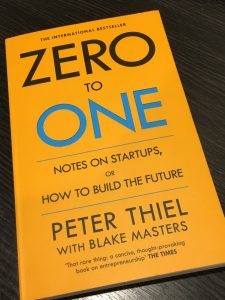Have been reading “Zero to One” by Peter Thiel – one of the founders of PayPal – which has the subtitle: “Notes on startups OR how to build the future”. There is a really interesting section where he talks about clean green companies and social entrepreneurship that it might be worth throwing out to see what others think…. While I don’t agree with all his thoughts it is interesting to read opinions of others like this and be challenged about what we do think.
One aspect I do agree with is the idea kind of implied here that if we could move the dial on the “for profit” companies and get them to take more notice of social impacts then there could be a big change. I do worry that people may abdicate their responsibility in these areas by saying, “well, that’s what social enterprises do or think about so I don’t need to take any action and think about my own sourcing, staff policies, use of profits etc”.
For my longer analysis of the key points in the book you can access that here. Here is what he says:
“Cleantech entrepreneurs aimed for more than just success as most businesses define it. The cleantech bubble was the biggest phenomenon – and the biggest flog – in the history of “social entrepeneurship”. This philanthropic approach to business starts with the idea that corporations and nonprofits have until now been polar opposites: corporations have great power, but they’re shackled to the profit motive; nonprofits pursue the public interest, but they’re weak players in the wider economy. Social entrepenuers aim to combine the best of both worlds and “do well by doing good.” Usually they end up doing neither.
The ambiguity between social and financial goals doesn’t help. But the ambiguity in the word “social” is even more of a problem: if something is “socially good”, is it good for the society, or merely seen as good by society? Whatever is good enough to receive applause from all audiences can only be conventional, like the general idea of green energy.
Progress isn’t held back by some difference between corporate greed and non-profit goodness; instead, we’re held back by the sameness of both. Just as corporations tend to copy each other, nonprofits all tend to push the same priorities. Cleantech shows the result: hundreds of undifferentiated products all in the name of one overbroad goal.
Doing something different is what’s truly good for society – and it’s also what allows a business to profit by monopolizing a new market. The best projects are likely to be overlooked, not trumpeted by a crowed; the best problems to work on are often the ones nobody else even tries to solve.”
Am curious – what do others think? Drop me a line at stevenmoe@parryfield.com




